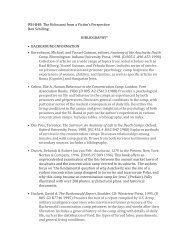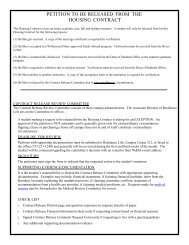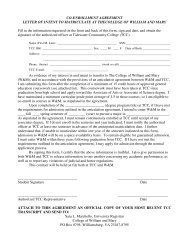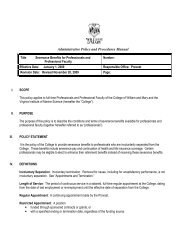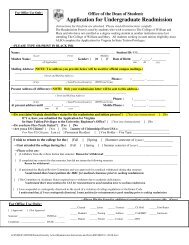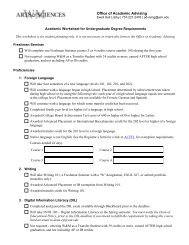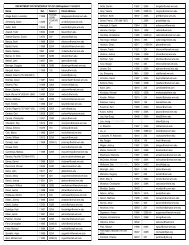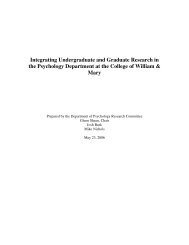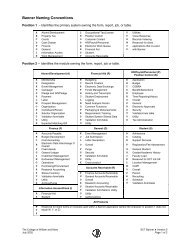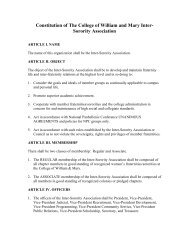Course Selection Guidebook [pdf] - College of William and Mary
Course Selection Guidebook [pdf] - College of William and Mary
Course Selection Guidebook [pdf] - College of William and Mary
Create successful ePaper yourself
Turn your PDF publications into a flip-book with our unique Google optimized e-Paper software.
<strong>Course</strong> <strong>Selection</strong> <strong>Guidebook</strong> – Fall 2011232. Medieval Philosophy(GER 4A) Spring (3) LemosAnalysis <strong>of</strong> selected writings <strong>of</strong> major medieval philosophers such as Augustine, Erigena, Anselm,Maimonides, Aquinas, Duns Scotus <strong>and</strong> Occam.252. 17 th- <strong>and</strong> 18 th -Century Philosophy(GER 4A) Fall (3) RadclilffeAn examination <strong>of</strong> rationalism (e.g. Descartes, Spinoza, Leibniz), empiricism (e.g. Hume, Locke,Berkeley) <strong>and</strong> their culmination in Kant.301. Symbolic Logic - Fall <strong>and</strong> Spring (3) An introduction to the principles <strong>of</strong> valid reasoning.Special emphasis will be given to modern symbolic techniques <strong>and</strong> some <strong>of</strong> their applications.303. Ethics - (GER 7) Fall <strong>and</strong> Spring (3) An introduction to the problems <strong>of</strong> ethics <strong>and</strong> the nature<strong>of</strong> ethical reasoning. Included are historically important topics such as hedonism, egoism,utilitarianism, <strong>and</strong> relativism. Contemporary moral issues such as abortion, euthanasia, <strong>and</strong> civildisobedience will also be addressed.PhysicsThe Physics Department provides three types <strong>of</strong> courses for entering students with varying levels<strong>of</strong> interest in physics <strong>and</strong> with differing degrees <strong>of</strong> mathematical preparation. The first type is arigorous sequence, Physics 101-102, which is appropriate for prospective physics <strong>and</strong> othermathematics <strong>and</strong> science concentrators. The second, Physics 107-108, provides an introduction tophysics for students whose curriculum focus will be in the life sciences. Finally, there are specialtycourses, Physics 105, 109-110, <strong>and</strong> 176.Physics 101-102 are the appropriate courses for those who desire a strong, calculus-basedknowledge <strong>of</strong> introductory physics. Prospective physics majors should take Physics 101 duringtheir first semester. Other science majors may usually defer registration until the sophomore year.Physics 102H is an Honors section for students who have excelled in 101 or who have a stronghigh school background in mechanics, but not in electricity, magnetism or thermodynamics.Physics 107-108 is an appropriate sequence for students, including pre-meds, who plan to major inthe life sciences. It also introduces the new pre-medical track <strong>of</strong> the physics major. It is based uponmathematics at the level <strong>of</strong> elementary algebra <strong>and</strong> trigonometry. The associated laboratory isrequired.Physics 121 <strong>and</strong> 176 are specialty courses appropriate for students who have an interest in thestudy <strong>of</strong> music <strong>and</strong> astronomy, respectively. Most <strong>of</strong> the physics needed to study these disciplinesis taught in the courses themselves, but high school physics <strong>and</strong> chemistry are very useful. Onlymathematics involving algebra <strong>and</strong> trigonometry is used.For details regarding the AP examinations, please refer to Section IV <strong>of</strong> this <strong>Guidebook</strong>. Thosewho do receive AP credit for Physics 101-102, <strong>and</strong> who wish to pursue further work in physics,should register for Physics 201 (Modern Physics).For more information, please contact the department at (757) 221-3500.Introductory <strong>Course</strong>s69


![Course Selection Guidebook [pdf] - College of William and Mary](https://img.yumpu.com/46952524/69/500x640/course-selection-guidebook-pdf-college-of-william-and-mary.jpg)
